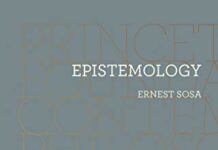
Ebook Info
- Published: 2010
- Number of pages: 176 pages
- Format: PDF
- File Size: 0.57 MB
- Authors: Ernest Sosa
Description
In this book, Ernest Sosa explains the nature of knowledge through an approach originated by him years ago, known as virtue epistemology. Here he provides the first comprehensive account of his views on epistemic normativity as a form of performance normativity on two levels. On a first level is found the normativity of the apt performance, whose success manifests the performer’s competence. On a higher level is found the normativity of the meta-apt performance, which manifests not necessarily first-order skill or competence but rather the reflective good judgment required for proper risk assessment. Sosa develops this bi-level account in multiple ways, by applying it to issues much disputed in recent epistemology: epistemic agency, how knowledge is normatively related to action, the knowledge norm of assertion, and the Meno problem as to how knowledge exceeds merely true belief. A full chapter is devoted to how experience should be understood if it is to figure in the epistemic competence that must be manifest in the truth of any belief apt enough to constitute knowledge. Another takes up the epistemology of testimony from the performance-theoretic perspective. Two other chapters are dedicated to comparisons with ostensibly rival views, such as classical internalist foundationalism, a knowledge-first view, and attributor contextualism. The book concludes with a defense of the epistemic circularity inherent in meta-aptness and thereby in the full aptness of knowing full well.
User’s Reviews
Reviews from Amazon users which were colected at the time this book was published on the website:
⭐This is a very strange situation. The author has been writing books about knowledge and epistemology for years without ever apparently engaging with the most important and innovative epistemologist and philosopher of science in modern times, namely Karl Popper.It is all very well to address issues like the justification of belief but to persist in that quest (which appears to be making very little progress) without even acknowledging that Popper has provided an alternative approach is very lazy scholarshp and does no good for the students who are supposed to be put in touch with the best that has been thought and written in the field.In the face of the logical positivists, the logical empiricists and others, Popper has taken four “turns” to advance the study of knowledge and its growth. First the conjectural or hermeneutic turn, to insist on the inevitably conjectural nature of even our best scientific knowledge. Second the objective turn, from beliefs to public, inter-subjective knowledge of which the most refined form is found in science. Taken together, these turns replace the quest for justified belief with the aim of forming critical preferences for one theory rather than another.Third is the social turn to take account of the context and especially the “rules of the game” or the conventions of learning, which can of course be criticized and improved. That is a turn that Wittgenstein took but without engaging with scientific and political issues in the way that Popper proceeded.Fourth was the revival of metaphysics in the heart of the scientific enterprise, not entirely original but very much in defiance of the positivists and empiricists who were his major sparring partners. His theory of metaphysical research programs had an early release in the form of the Lakatosian methodology of scientific research programs but that was a degenerative version because Lakatos eliminated the essential element of criticism of the metaphysical core of the program.Popper’s program, from Logic der Forschung (1935) through The Open Society and its Enemies (1945), Conjectures and Refutations (1963) and Objective Knowledge (1972) to Realism and the Aim of Science (1983) cannot be ignored in any study of epistemology that claims to be fully informed and progressive.
⭐I am sorry, but Sosa, who, by the by, has never, despite Princeton labeling this ‘The long awaited first monograph from a leading Epistemologist [,] authored a book. Your statement that he has, ‘for years’ been writing books on the theory of knowledge is simply inaccurate. Dr. Sosa has edited volumes, has edited Journals, and has authored well over 200 Articles, though his books are transcribed Lectures (such as the subtitle of this particular text indicates), perhaps most notably the John Locke Lectures at Oxford, of which their Press issued 2 Volumes on Dr. Sosa’s original thesis of Virtue Epistemology. His 1991 collection of essays (Knowledge in Perspective: Selected Essays in Epistemology, Cambridge University Press) is one of the most valuable texts in this sib-field of Philosophy, as it lays out the foundation for both the J. Locke Lectures and the text now under discussion.I mean no disrespect, though I am curious as to why your Review is a further lionization of Karl Popper’s theories of knowledge and not a recitation of your thoughts on Sosa’s present text.It is saddening that those who are not familiar with Dr. Sosa’s work will see a single, 1-star Review of his rather fine work.I wonder, do you find Professor Sosa’s earlier Articles and Cambridge publication to be of value? or does that edition suffer from not being an intellectual biography of Karl Popper? By the by, Popper himself wrote his own autobiography, one that I read and enjoyed, and one where he laid out his own ideas. Beyond that text, he wrote others that expounded on his theories of confirmation. I just find myself a bit confused as to why you are upset that, in this slim work, Dr. Sosa did not refer to Popper’s theories, theories which, on the whole, and particularly in the context of these Lectures, do not really have much of a place, as the ideas of both these great Philosophers differ in approach.With Respect
Keywords
Free Download Knowing Full Well (Soochow University Lectures in Philosophy Book 3) in PDF format
Knowing Full Well (Soochow University Lectures in Philosophy Book 3) PDF Free Download
Download Knowing Full Well (Soochow University Lectures in Philosophy Book 3) 2010 PDF Free
Knowing Full Well (Soochow University Lectures in Philosophy Book 3) 2010 PDF Free Download
Download Knowing Full Well (Soochow University Lectures in Philosophy Book 3) PDF
Free Download Ebook Knowing Full Well (Soochow University Lectures in Philosophy Book 3)





